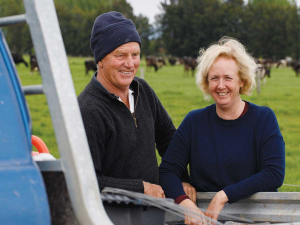DairyNZ opens applications for associate director role
DairyNZ is giving New Zealand farmers a unique opportunity to gain hands-on governance and leadership experience within the dairy sector.
 Corrie and Donna Smit are applying lessons from previous industry peaks and troughs at a time when many farmers are struggling to maintain profitability.
Corrie and Donna Smit are applying lessons from previous industry peaks and troughs at a time when many farmers are struggling to maintain profitability.
After 30 years’ dairying on the same Bay of Plenty farm, Donna and Corrie Smit have learnt lessons on weathering everything from devastating floods to milk price fluctuations.
As dairy farm costs climb ever upward, the Smits are applying their lessons from previous peaks and troughs at a time when many farmers are struggling to maintain profitability.
Farmers involved in DairyNZ’s Budget Case Study project, which includes the Smits, have experienced an average increase in operating expense over the past 2 years of an eye watering 23%, up from $4.34/kgMS to $5.35/kgMS*.
That $1.01/kgMS jump in costs has been covered by the rise in gross farm revenue of $1.26, most of this being needed to pay for the higher interest rates and living expenses.
Donna says she and Corrie have stuck to a “keep it simple” approach throughout their farming career.
At its core, and playing a key part in holding costs down, is the mantra to “grow more grass and turn it into milk”, capitalising on what will always be the lowest-cost feed source at hand.
That ability to maximise the cheapest feed possible has been aided by committing to the highest quality farm they could.
The free-draining productive flats around Edgecumbe were not the cheapest when they purchased their farm, but they’ve proven the most capable of generating quality grass.
Today, the property they’ve added to 14 times is “tidy but not highly automated”, reflecting their simple approach, she says.
Growing plenty of grass has enabled them to hold their farm working expenses (note, this excludes unpaid family labour and depreciation, which are operating expenses) at around $2.90/kgMS over the past few years, pushed up to $3.50/kgMS for the past year.
The usual suspects also appear on their list of increased costs, namely electricity, fertiliser, fuel, rates and supplement.
Their ability to adjust to rising farm costs stems from their second principle: to keep costs as variable as possible, rather than be lumbered with ongoing, fixed costs.
The Smits also work hard to minimise wasteful hidden costs throughout the farm operation. This demands a quick response to problems, whether it’s a leaky trough or lame cows, whereas leaving those problems results in a far greater expense later.
The Smits have also worked hard to build strong relationships with the businesses and suppliers they deal with, often for decades.
“In return, we do expect quality, service and cost effectiveness,” says Donna.
These open, well-founded relationships enable them to have honest conversations about price rises.
Future costs include emissions.
Donna and Corrie are tackling the future challenge of greenhouse gas emissions pricing in a manner that also fits with their low-cost, simple approach.
“We’re focusing on breeding better, lighter cows that deliver more kilograms of milksolids per kg of bodyweight, by moving from a Friesian herd to a cross-bred herd.
With no relief from cost rises appearing on the horizon, the Edgecumbe farm may be well positioned for a major shift in operations in coming years.
Their ability to move cows that are suited or not suited to such a system between the farms makes it an appealing option. Labour savings, and an interesting new way to continue dairying, are also attractive.
Donna sees robotic milking becoming a popular option, particularly on smaller North Island dairies, as aging owners look to stay engaged with farming but in a less physical way.
“We’re not quite there yet in terms of the capital cost, but I think it will be getting closer with the next generation of milking robots.”
The World Wide Sires National All Day Breeds Best Youth Camp Best All Rounder plaudit has become family affair, with 2026 Paramount Cup winner Holly Williams following in her sister Zara's footsteps.
DairyNZ is giving New Zealand farmers a unique opportunity to gain hands-on governance and leadership experience within the dairy sector.
Herd improvement company LIC has posted a 5.2% lift in half-year revenue, thanks to increasing demand for genetics.
According to the latest Fresh Produce Trend Report from United Fresh, 2026 will be a year where fruit and vegetables are shaped by cost pressures, rapid digital adoption, and a renewed focus on wellbeing at home.
The Roar is a highlight of the game hunting calendar in New Zealand, with thousands of hunters set to head for the hills to hunt male stags during March and April.
OPINION: The past few weeks have been tough on farms across the North Island: floods and storms have caused damage and disruption to families and businesses.

OPINION: Meanwhile, red blooded Northland politician Matua Shane Jones has provided one of the most telling quotes of the year…
OPINION: This old mutt has been around for a few years now and it seems these ‘once in 100-year’ weather…